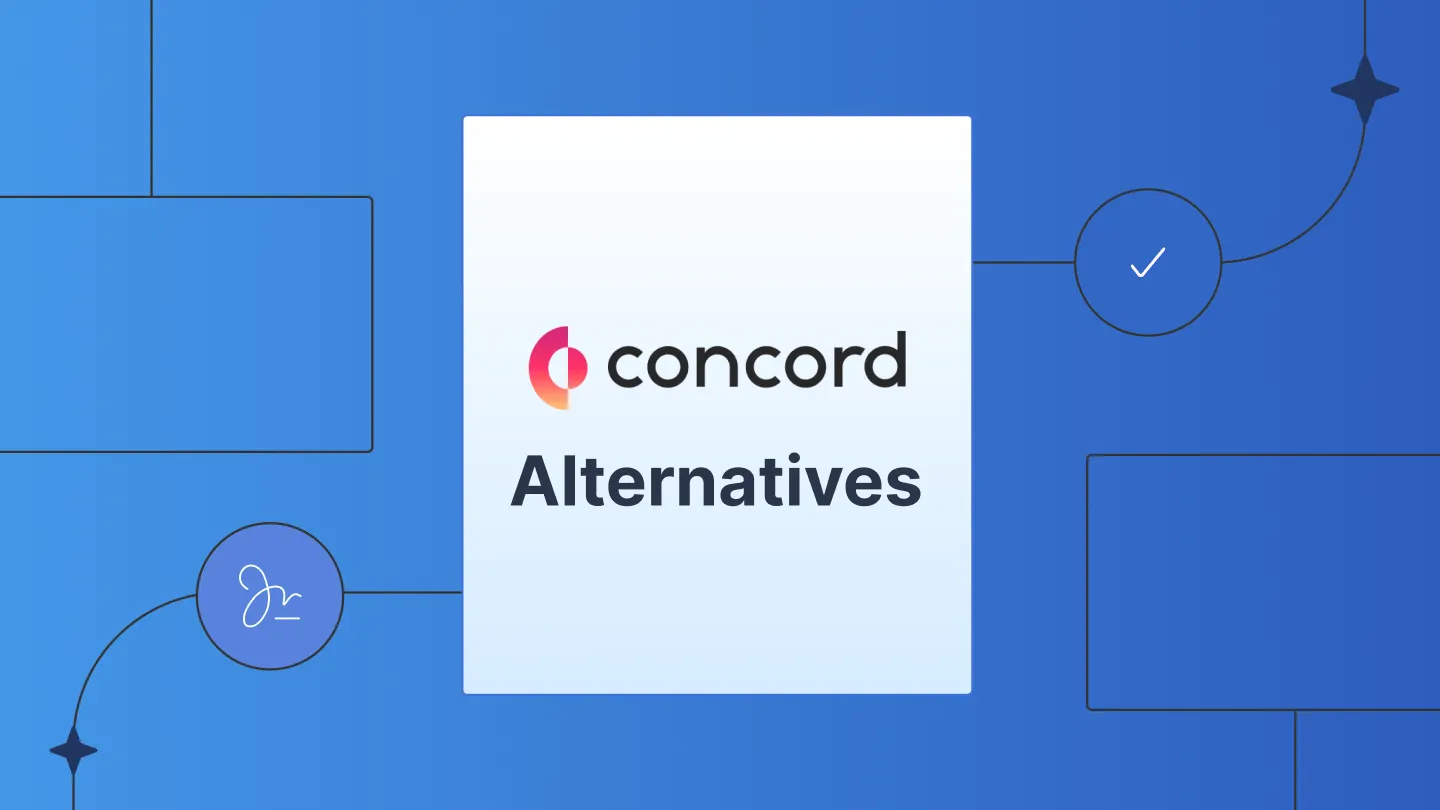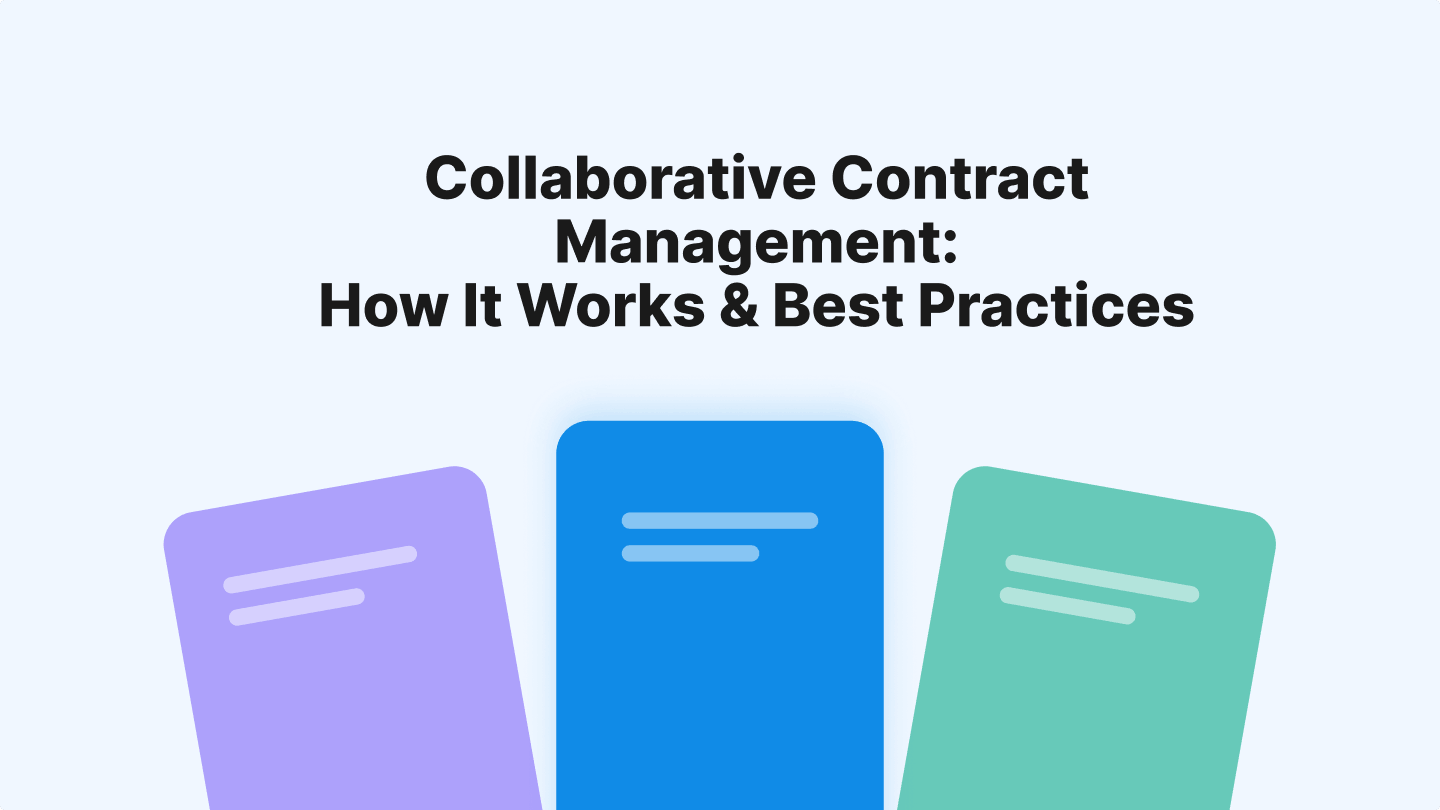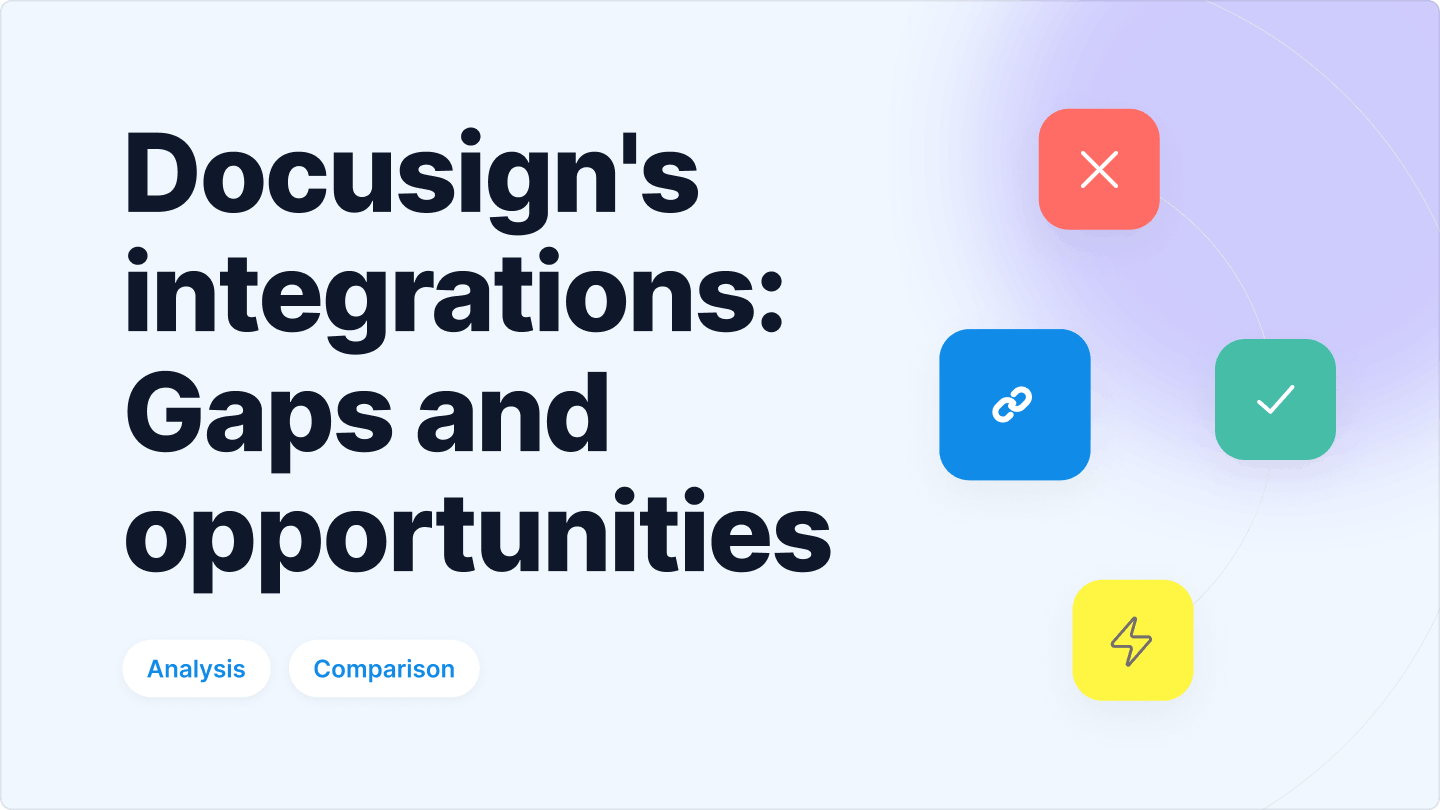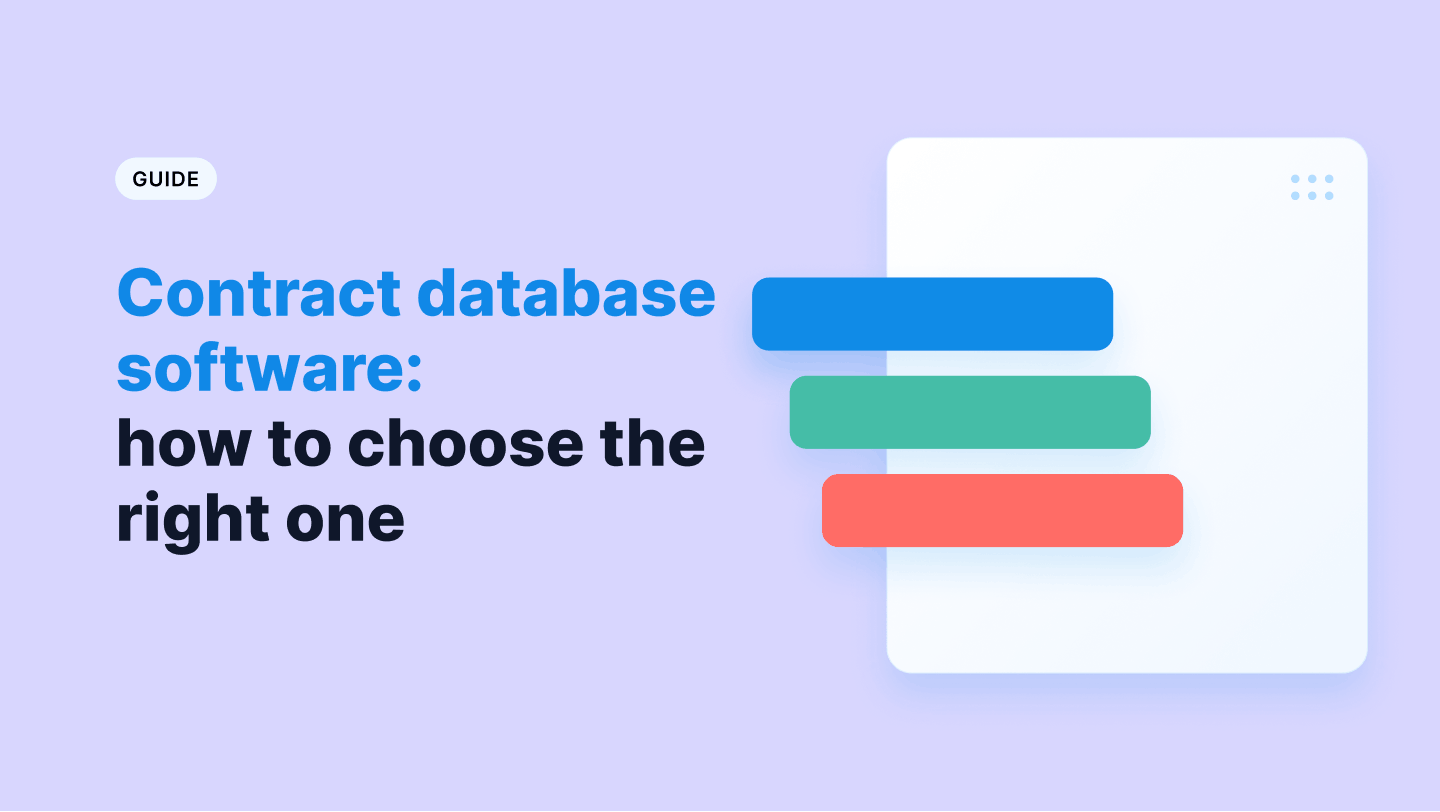Poor editing, clunky field alignment, or no mobile push alerts made some users wish for more advanced automation and smarter workflows.
You’re probably feeling the same if you’re here. That’s why we’ve rounded up some of the best Concord alternatives that offer similar features but with fewer limitations.
So, bookmark this page for your future reference, and let’s start with a quick preview of the top picks we’ll dive into in detail below.
The following platforms represent some of the best Concord alternatives available today:
- Signeasy for AI-powered contract management and seamless eSignatures
- Docusign for enterprise-grade workflows and global compliance support
- PandaDoc for dynamic document creation and sales-focused automation
- Conga for end-to-end CLM with deep Salesforce integration
- airSlate SignNow for fast, scalable eSigning with flexible pricing
- Ironclad for advanced legal workflows and collaborative contract lifecycle management
- Icertis for AI-driven CLM built for complex enterprise environments
- Adobe Acrobat Sign for robust PDF-based signing with Microsoft 365 integrations
- Jotform Sign for customizable eSigning workflows built into form-based data collection
- ContractSafe for secure, searchable contract storage and deadline tracking
Top 10 Concord competitors at a glance
We gathered insights from trusted product review sites like G2, Capterra, Gartner, SoftwareSuggest, and forums like Reddit.
Our product team, who works directly with users, also pitched in to share user feedback, pain points, and what businesses truly value in a contract management solution.
This helped us draw a well-rounded breakdown of Concord and its alternatives.
What is Concord?
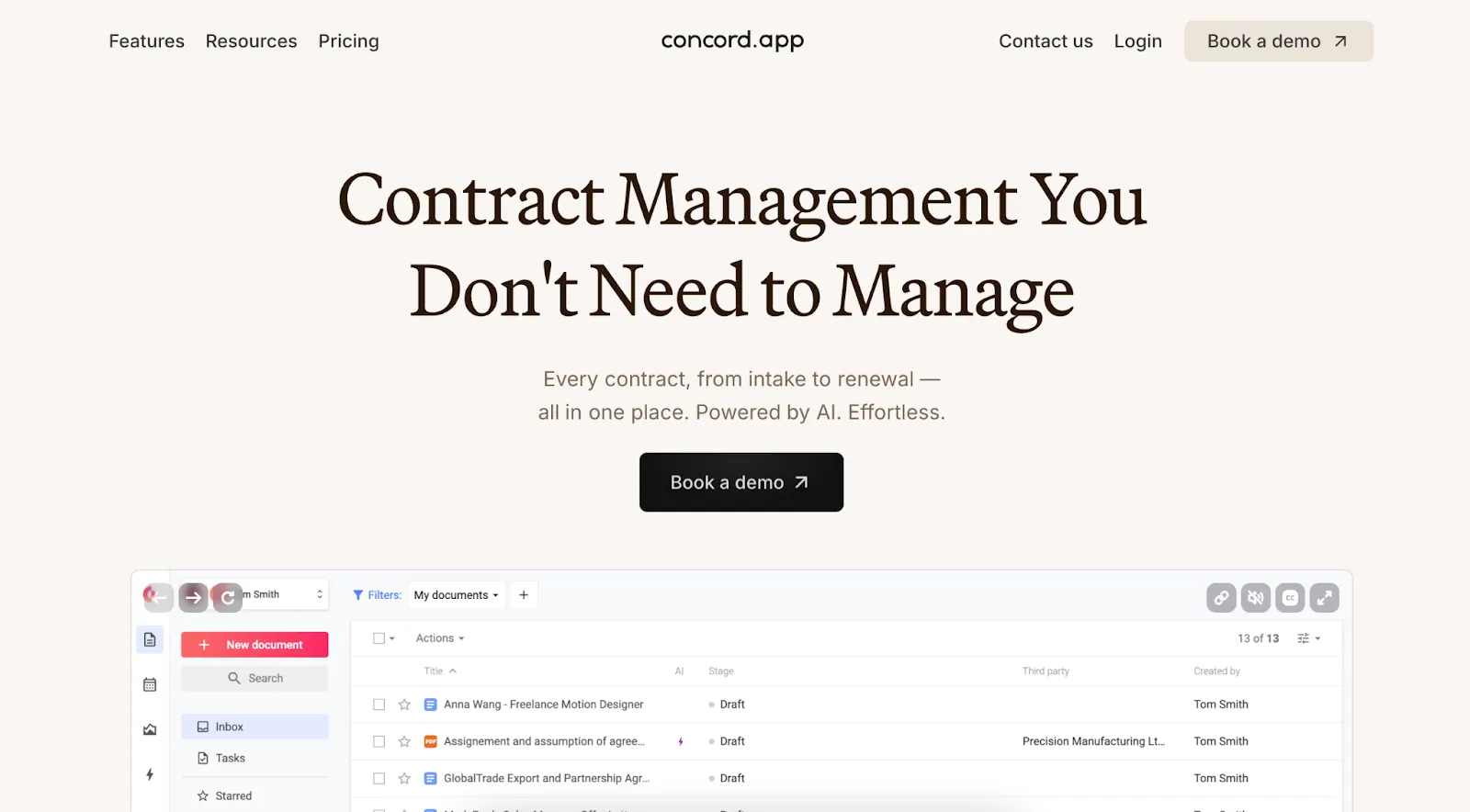
Concord is a cloud-based contract lifecycle management platform that lets you streamline the entire contract lifecycle, from creation to eSignatures.
With Concord, you can build customizable templates, insert pre-approved clauses from a handy clause library, and even auto-fill contracts with data from tools like Salesforce or Excel. Got a team? Concord lets everyone collaborate in real time, from commenting, editing, to approving.
It also offers powerful features like automated approval workflows, version tracking, and comment threads within the Concord document, and many more.
Plus, with integrations like Google Drive, Dropbox, Box, Docusign, HubSpot, and Zapier, you can connect it seamlessly into your workflow.
Why businesses look for Concord alternatives
If you’re looking for a solution that fits your budget and grows with you, it’s only fair to explore other Concord alternatives. Below, we break down the common reasons pushing teams to make the switch.
1. Expensive pricing plans
Concord’s most basic plan, “Essentials,” starts at $399/month for 5 users, which breaks down to nearly $80 per user/month. It can become expensive if you're a small business or a fast-growing team trying to keep costs down.
Compare that to other alternatives like Signeasy, Docusign, or Adobe Acrobat Sign, where pricing typically starts between $10 - $30 per user/month. You’re getting many of the same essentials, eSignatures, templates, and reminders. You can also compare pandadoc vs docusign in detail.
What’s more, features like custom email branding are only available on Concord’s Enterprise plan, and admin tools like role-based access or team management are locked behind the expensive Business tier.

2. Poor user experience
While many users appreciate how simple and flexible Concord is to use, several have pointed out that the overall user experience doesn’t always hold up.
From critical bugs like contracts being shared with the wrong people, to copy-paste workarounds for basic tasks like reusing templates, the platform can feel troublesome for teams that need speed and precision.
“The software's update cycle is slow, with almost no new features introduced over the past year. As someone who runs a design agency and has extensive knowledge in product management, I believe these issues reflect a flawed management style within the company, casting doubts on its future prospects. In light of these experiences, I am considering switching to alternative tools.”- Concord review on G2
So, even though the interface might look clean and easy to navigate, the behind-the-scenes experience hasn’t lived up to expectations for everyone. That’s a big reason why many businesses start exploring Concord alternatives that offer the same ease of use, but with more reliability and fewer glitches.
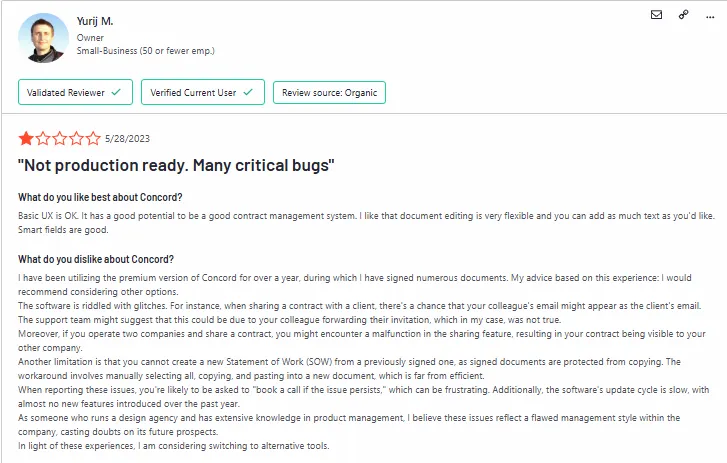
3. Editing limitations
Another reason businesses start looking into Concord alternatives is the editing experience. Several users have shared that while Concord offers customization options, things like formatting glitches, lack of drag-and-drop fields for dates or initials, and poor offline support can really slow you down.

Others mentioned that once a document is sent for signature, it becomes locked, leaving no room for last-minute changes unless you start from scratch. Some also complain about the noisy editing view, when every change (even minor formatting) is shown, it’s hard to focus on what actually matters.
While Concord’s team is responsive to feedback, these limitations make it tough for teams who need a fast, flexible, and reliable editing process. Here's what a user has to say about Concord’s editing features:
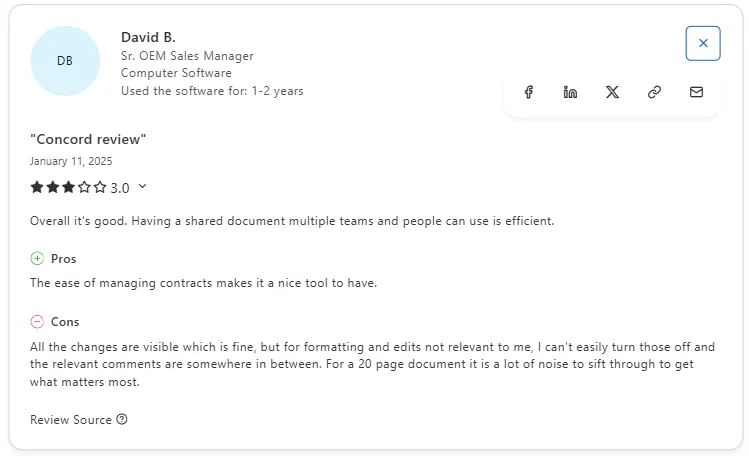
4. Lack of automation features
Advanced automation is another area where Concord’s features often fall short. A few reviewers pointed out the lack of automatic renewal reminders. This means contracts that auto-renew quietly roll into the next term without a heads-up. Not ideal if you're trying to stay on top of deadlines.
Others mentioned how status labels are auto-generated and can’t be edited, leading to confusion, especially in multi-stage workflows. When you're managing dozens or hundreds of contracts, every bit of automation helps. That’s why they look for Concord alternatives that give more control over automation.
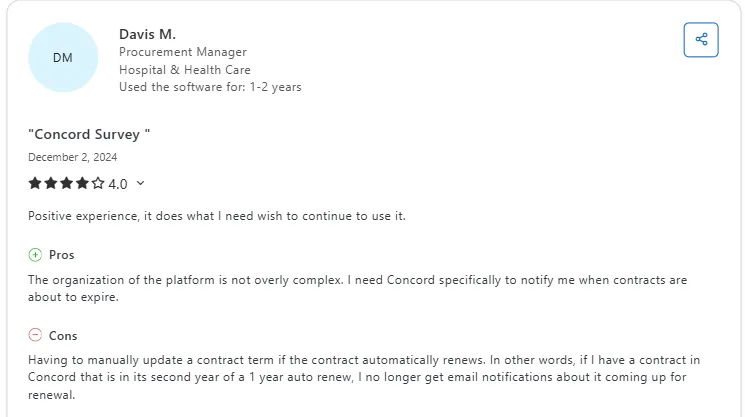
5. Lack of a mobile application
Concord is a web tool and lacks a dedicated mobile app, something that’s becoming a must-have. That’s why mobile functionality is one of the top things to consider when exploring Concord alternatives.
A good end-to-end contract management solution should also offer high user ratings, a smooth and reliable experience, built-in automation features like reminders and templates, strong security, and flexible pricing that grows with your team.
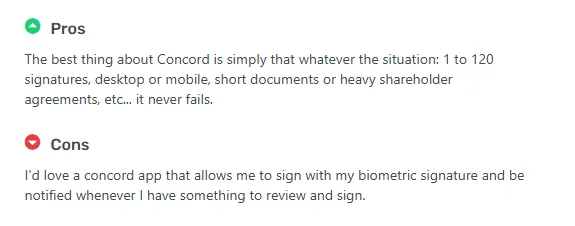
Features to consider when choosing a Concord alternative
Concord offers a solid set of contract management features, but lacks in a few areas like automation, mobile access, editing reliability, and user experience. So if you’re checking out Concord alternatives, here are the features you should prioritize:
1. Overall user experience
A good contract management solution is just not about how easy it is to use, but more about how everything works together. Your tool should feel consistent, responsive, and frustration-free. With no confusing interfaces, random bugs, or unnecessary glitches.
2. Mobile access
Look for a platform with a dedicated mobile app that lets you create, edit, and sign documents wherever you like. It’s a must on the checklist if you’re from industries like real estate, sales, and logistics.
3. Easy-to-use interface
Choose a tool that’s intuitive, with a short learning curve, so your team doesn’t need weeks of training to get started.
4. Advanced automation
Features like automatic renewal reminders, notifications, contract expiration alerts, bulk send, and customizable approval workflows will save you serious time on manual follow-up.
5. Reliable editing and version control
You’ll want seamless editing with auto-save, drag-and-drop fields, and a clear version history that helps teams work without fear of losing progress.
6. Custom roles and permissions
Ensure the tool offers flexible role-based access controls so teams can collaborate securely without sharing too much, or too little.
7. Template and clause management
Having reusable templates and a centralized clause library makes it easier to draft error-free contracts faster.
8. Integrations with popular tools
Support for platforms like Google Drive, Dropbox, Salesforce, and Slack helps keep your workflow smooth and centralized.
9. Transparent pricing
Choose a platform with clear, flexible pricing plans that cater to startups and growing businesses alike, without locking key features behind premium tiers.
10 best Concord alternatives
After comparing pricing, features, and reviews, we’ve curated a list of the top 10 Concord alternatives and competitors just for you:
1. Signeasy

Signeasy is a stronger, more flexible, and feature-rich Concord alternative for fast-growing teams. Signeasy’s pricing plans start at just $10/user/month. Even the most feature-rich Business Pro plan is $30/user/month, with no surprise paywalls for essentials like role-based access, contract tracking, or real-time collaboration.
From the Business plan onward, you get access to advanced admin features like roles and permissions, an admin dashboard, multiple admin support, audit logs, and even team usage reports. These features are ideal if you need to stay on top of activity without micromanaging every document manually.
Signeasy’s automation features are also advanced compared to Concord. You can send reminders, track read receipts, enable automatic notifications, export contacts, use bulk send, and even get renewal reminders.
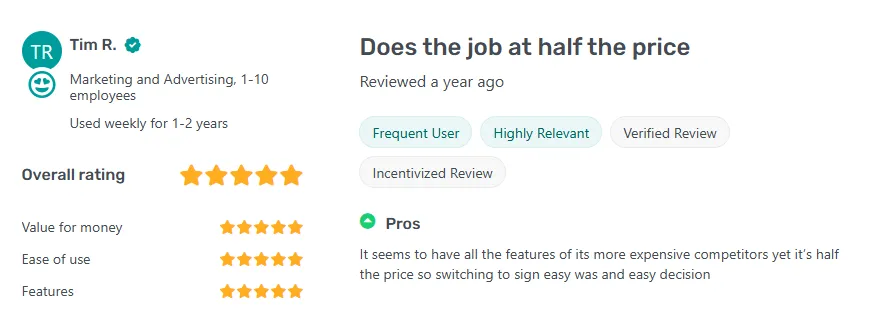
Users often praise Signeasy’s fast update cycles driven by real user feedback, while Concord reviewers have called out a noticeable lag in new features. Combine that with our responsive customer support and effortless onboarding, and it’s easy to see why Signeasy is a better Concord alternative.
Concord currently lacks a mobile app. Signeasy offers highly-rated apps on both Android and iOS, perfect for industries like real estate, construction, or field services, where flexibility is a must.

Signeasy also offers a separate, transparent API pricing plan that lets you integrate the tool into your existing CRM or ERP. For teams handling high contract volumes, our Intermediate and Advanced API plans offer 1,000 to 2,000 eSignature requests, along with webhooks, reusable and pre-filled templates, custom stamps, multi-factor authentication, document embedding, and dedicated support.

Here are some more standout features of Signeasy:
- Intuitive user experience: Signeasy has a clean and easy-to-use interface. We offer effortless onboarding with clear documentation, step-by-step tutorials, and personalized support.
- Integrations: Signeasy offers direct integrations with Google Workspace. Microsoft 365 and HubSpot.
- AI assistance: Get instant AI summaries, extract key terms, and ask specific questions related to your document.
- Enterprise-grade security: We meet major regulatory standards like HIPAA, SOC 2, GDPR, ESIGN Act, and eIDAS. Signeasy uses AES-256 encryption for data at rest. With MFA, Single Sign On (SSO), digital stamps, Signature ID, and PKI encryption, adds multiple layers of security.
- Document edit: With Signeasy, you can modify documents before sending them for signing. You can use the drag-and-drop feature for uploading and adding fields to documents.
- Signer attachments: Request additional documents from signers for verification.
- Personalized branding: Add your brand’s logo and colors to maintain consistency.
- Centralized billing and dashboard: Manage users, track document activity, and handle billing from a single interface.
Pros
- Affordable, feature-rich pricing plan starts at $20/month/user
- Available on both iOS and Android
- No hidden costs or additional charges to use the essential features.
- Fast onboarding, minimal bugs, fast update cycles, and easy navigation.
- Smart contract summaries, term extraction, and review tools.
Cons
- Some advanced features, like SSO and bulk send, are part of higher-tier plans.
- Signeasy integrates with popular tools like Google Workspace, Microsoft 365, and HubSpot. But currently, it offers limited native CRM integrations.
Ratings: 4.7/5 on G2
2. Docusign

Docusign Intelligent Agreement Management (IAM) is another popular Concord alternative you can choose. It’s known for its enterprise-grade security, GDPR compliance, and an extensive feature set that helps streamline your agreement workflows.
However, Docusign has its own drawbacks as well. Some users report billing issues, like being double-charged or facing hurdles during cancellation. Others find the platform’s interface a bit dated and sluggish, especially when compared to other alternatives in this list.

Functionality-wise, Docusign offers solid CLM features, but with monthly usage limits. For example, you’ll get only 100 agreements per user/month on the Standard plan. That might feel restrictive if your contract volume grows over time. Also, advanced compliance features like HIPAA, 21 CFR Part 11, and ID verification are not included within the plans. You’ll have to pay extra and contact sales for the pricing.

Docusign customer support is another factor you must consider before choosing. You need to purchase their separate support plans for dedicated integration help or faster response times. So, for growing or high-volume teams looking for affordability, flexibility, and simpler support, Docusign may not be the perfect fit.
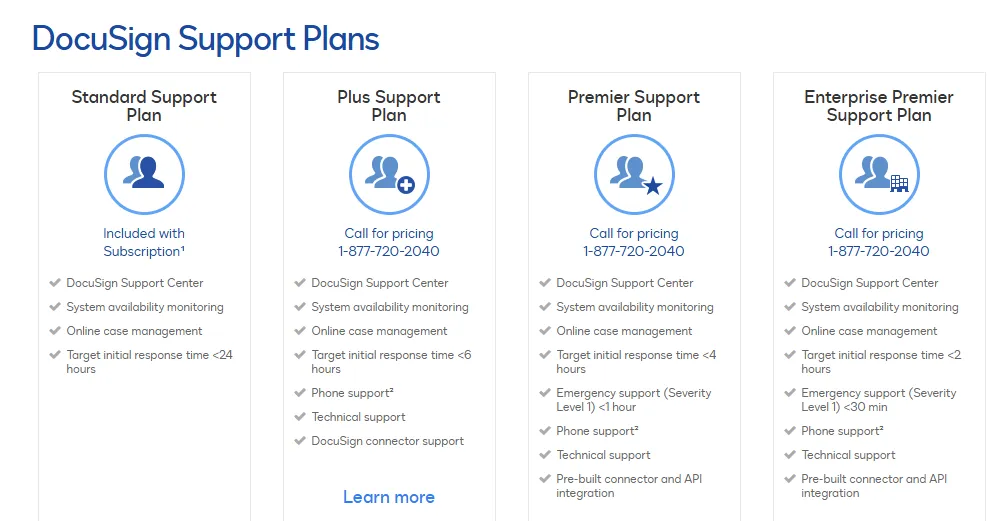
Pros
- You can add calculated fields to auto-add, subtract, multiply, or divide values with the document.
- Offers built-in payment collection to collect payments, request signatures in a single workflow.
- Offers GDPR compliance, audit trails, and advanced encryption to keep agreements safe.
- Best for large organizations needing complex workflows and integrations.
Cons
- Advanced features or dedicated support come at an extra cost.
- Extensive feature sets can be overwhelming for businesses that aren’t enterprises or don’t have multiple teams
- Users often complain about the platform’s poor responsiveness and outdated user experience.
Ratings: 4.5 / 5 on G2
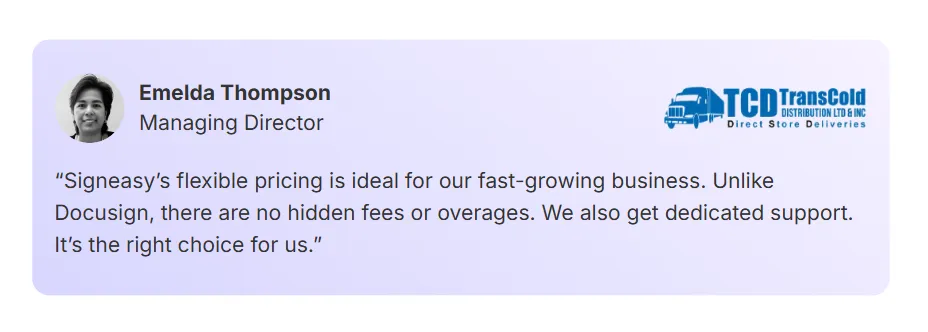
3. PandaDoc

PandaDoc is a great Concord alternative, especially for sales-driven teams. It stands out for its robust document editor, smooth UI, and automation features. Users love the quote builder, product catalog, CRM integrations, and real-time tracking tools, which cut down on back-and-forth and help close deals faster.
However, some users have reported frustrating bugs, especially on the mobile app, where fields sometimes get misaligned, affecting usability in the field.
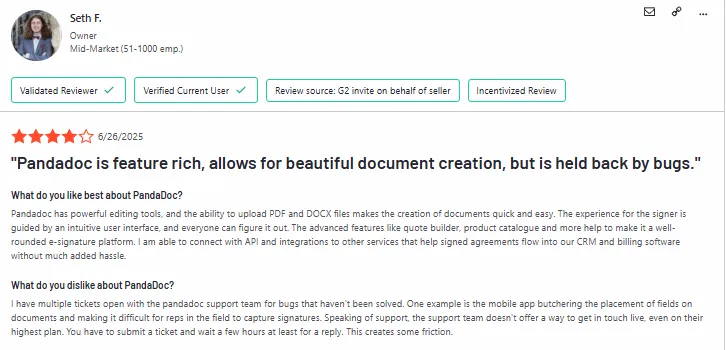
Moreover, while PandaDoc’s core support is available via chat and email, live or priority support requires an upgrade. Essential contract management features like team roles, contract renewals, and verification options also come as paid add-ons, which can increase the total cost for non-sales teams like legal or HR.
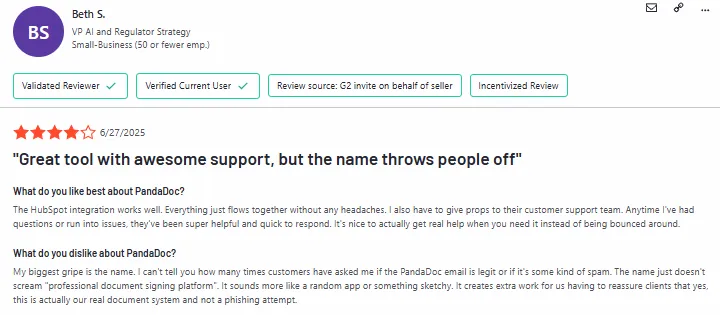
Pros
- Intuitive editor makes creating and customizing documents super simple.
- Streamlined workflows help automate tasks from creation to signing and tracking.
- Quote builder & product catalog features are great for sales teams and proposal management.
- Seamless CRM integrations with tools like HubSpot, Salesforce, and billing platforms.
Cons
- Premium, dedicated support is available at an additional cost.
- Essential features like team workspace and renewal reminders come as paid add-ons.
- Higher total cost of ownership for scaling teams due to limited feature access in base plans.
Rating: 4.7/ 5 on G2
4. Conga CLM
Pricing: Custom quote
Conga CLM is a part of Conga’s Revenue Lifecycle Management (RLM) solution. It offers a suite of integrated tools, like Conga Composer, Conga Sign, and Conga CPQ for fast, accurate quoting.
If you're already using Salesforce, Conga’s tight integration can really streamline your workflow and keep all your contract data in sync. Plus, with Conga Contract Intelligence powered by AI, you get extra visibility into risks and insights baked right into your agreements.
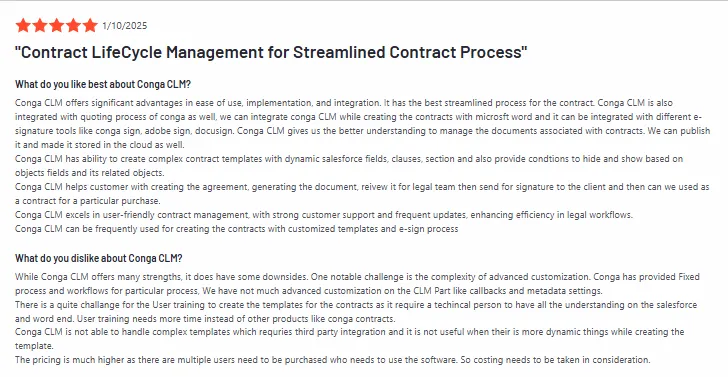
However, Conga’s official site doesn’t list monthly subscription plans. This works fine if you’re a large enterprise with highly specific needs. But for small and mid-sized teams looking for clear, upfront costs and more flexible subscriptions, it might not be the best option.
Also, if you're after a fast rollout or prefer plans that scale easily as you grow, alternatives with flexible, transparent pricing may offer a smoother onboarding.
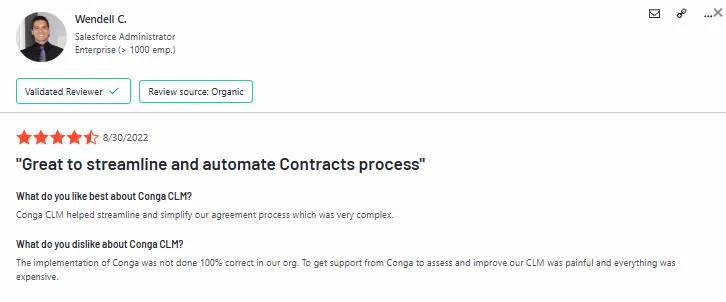
Pros
- Integration with other Conga tools and platforms like Salesforce offers seamless document creation, signing, and management.
- End-to-end CLM solution with tools for contract creation, management, and renewal
- Powerful Salesforce integration, ideal for businesses already using Salesforce
- Advanced document automation with Conga Composer and CPQ tools for fast, accurate quotes
Cons
- No transparent pricing listed on the website; must request a custom quote.
- Limited appeal for small teams that prefer ready-to-use, scalable plans.
- Potentially high total cost, better suited for large enterprises.
- Complex setup and configuration. Has a steep learning curve.
Ratings: 4.2 / 5 on G2
5. airSlate SignNow

airSlate SignNow is another Concord alternative you can try at a reasonable base price. It comes with unlimited templates, in-person signing, automated reminders, and audit trails, even on lower-tier plans. Its smooth integration with Google Drive, OneDrive, Salesforce, and Microsoft 365 is a big plus.
However, the tool is deeply tied to airSlate’s business cloud. So while you can use SignNow independently as an eSignature solution, it works better when paired with other airSlate tools. CRM/ERP integrations and phone support aren’t included unless you pay extra, making SignNow less budget-friendly than it first appears.

And while the interface is intuitive for many, some users still find the setup process a bit overwhelming. So while SignNow is solid for basic needs, it may fall short for teams with complex workflows or tighter budgets.

Pros
- Kiosk mode allows quick in-person signing for events or client-facing situations
- Enterprise-grade compliance with HIPAA, GDPR, SOC 2, and more (great for regulated industries)
- Bulk sending via CSV makes it easy to manage high-volume document distribution
- Affordable base plans with unlimited templates, fields, and in-person signing
Cons
- Phone support isn’t included, even on higher plans
- Some users report a learning curve, especially those less tech-savvy
- CRM/ERP integrations and priority support require additional purchases
Ratings: 4.6 / 5 on G2
6. Ironclad
Pricing: Custom quote
Ironclad CLM is a Concord alternative for legal teams managing complex, high-stakes contracts. Its centralized contract management, smooth integrations with third-party tools, and automated workflows make it easier for teams to keep everything under one digital roof.
However, several users have pointed out that while the tool looks polished, it can feel overly complex for new users, especially during the onboarding phase. Features like Insights reporting and recent UI updates have also received negative feedback from users.
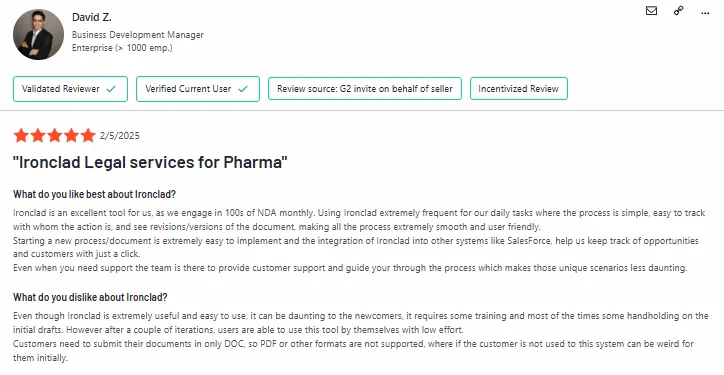
Plus, the lack of PDF upload support can be a roadblock, especially for teams accustomed to working in various document formats. Ironclad doesn’t display its pricing publicly, so small or mid-sized teams might hesitate to inquire, especially without knowing if onboarding or training comes at an extra cost.

Pros
- Strong integrations with tools like Salesforce, Google Drive, and Microsoft Word
- Great for legal teams managing large volumes of contracts
Cons
- Dashboard updates have cluttered the experience with unnecessary reports
- Recent UI changes require more clicks to complete simple tasks
- Steep learning curve for new users; onboarding can feel overwhelming
- Only accepts DOC file uploads, not friendly for PDF-heavy workflows
- Pricing is not disclosed publicly, making it hard for teams to evaluate upfront costs
Ratings: 4.5/ 5 on G2
7. Icertis
Pricing: Custom quote
Icertis is built for enterprise-level contract needs. It offers deep customization, robust integrations with tools like SAP, Salesforce, Microsoft, and Workday, and an AI-powered contract intelligence engine that helps teams review, analyze, and extract insights from contracts.

However, similar to Ironclad, pricing isn’t publicly available, so you need to request for custom quote, which makes it tough to estimate the total cost upfront. And while they offer extensive customization features, users say that it can become difficult to manage during upgrades. Some also noted that the onboarding process was lengthy and the system isn’t very intuitive, often requiring hands-on support.
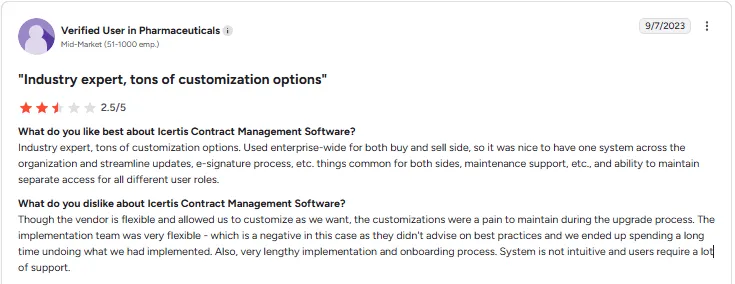
Pros
- Enterprise-grade contract lifecycle management with deep customization
- Seamless integrations with Salesforce, SAP, Microsoft, Workday, and more
- Great for managing high volumes of complex contracts
Cons
- Better suited for large enterprises; can be too complex for small or fast-growing teams
- No transparent pricing. Onboarding, integrations, and dedicated support may include extra costs
- Steep learning curve; users often need training or admin support to manage workflows
- Upgrade cycles and customization management can get tricky over time
Ratings: 4.2/ 5 on G2
8. Adobe Acrobat

Adobe Acrobat Sign is often praised for its robust features, strong compliance, and seamless integration with the broader Adobe ecosystem. Its advanced eSignature tools, enterprise-grade security, and compliance with regulations like HIPAA and GLBA (in higher-tier plans) make it a reliable choice for large organizations.
However, Adobe’s team plans come with an annual limit—150 transactions per user, which may not feel restrictive for high-volume businesses. Their business plan also restricts how large a single document upload can be (10 MB per file). So even if you can send multiple documents, each individual file must not exceed 10 MB.
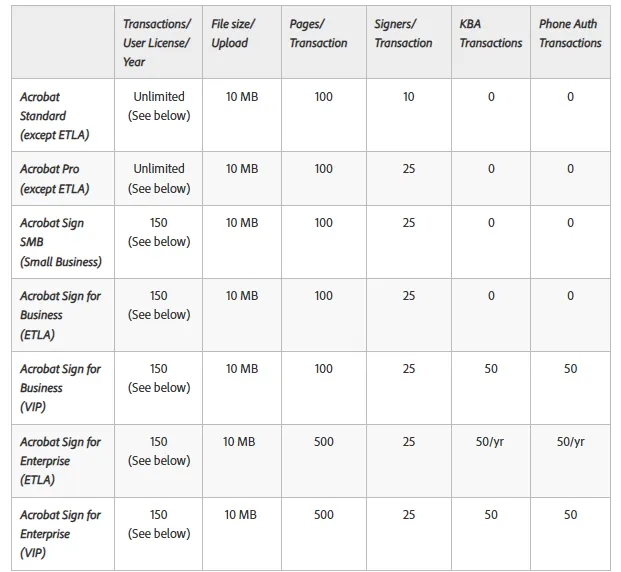
Adobe Acrobat Sign transaction limits
Besides, many of its most powerful features and compliance tools are locked behind enterprise plans. This creates a clear gap for small teams or startups who need top-level functionality without the enterprise price tag.
So, while it’s a great solution for those already embedded in the Adobe ecosystem or needing top-tier compliance, businesses with simpler workflows may find better value and flexibility with Concord alternatives that offer similar features at a more reasonable cost.
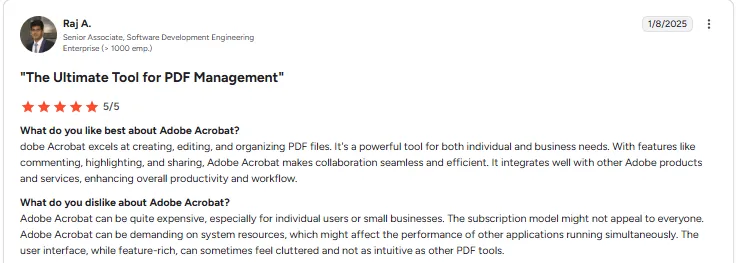
Pros
- Integrations with Adobe Acrobat DC and other Adobe Document Cloud products.
- Complies with HIPAA, GLBA, and more on higher-tier plans.
Cons
- Most business and enterprise plans limit users to 150 transactions/year, which isn’t ideal for high-volume teams.
- File size capped at 10MB per upload, which isn’t suitable for large volume contracts.
- AI Assistant comes with the Acrobat plan at an additional cost of US$4.99/mo per license.
Ratings: 4.5 / 5 on G2

9. Jotform

Jotform is primarily known as a powerful no-code form builder, but it has expanded into eSignatures through Jotform Sign. Its drag-and-drop interface is one of the most user-friendly features. It also offers rich templates, mobile responsiveness, and great integration with tools like Google Sheets, Slack, CRMs, and even payment gateways.
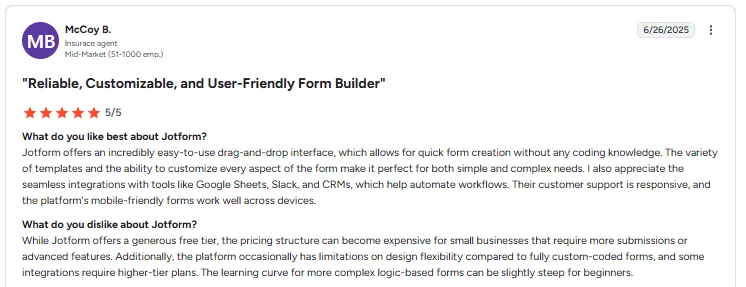
Compared to Concord, Jotform stands out in its simplicity and flexibility for basic document workflows. However, Jotform isn't a full-fledged contract lifecycle management (CLM) platform. It lacks advanced version control, redlining, approval workflows, and AI-based contract insights that tools like Concord, Ironclad, or Signeasy offer. Also, features like HIPAA compliance, signed document limits, or higher form submissions are gated behind pricier tiers, which may not be ideal for cost-conscious teams.

Pros
- Offers a wide range of template library for form creation.
- Works well with Google Sheets, Slack, CRMs, and payment tools.
Cons
- Gets expensive as your usage or feature needs increase.
- More suitable for internal forms or client-facing intake processes than full contract management.
Ratings: 4.7 / 5 on G2
10. ContractSafe
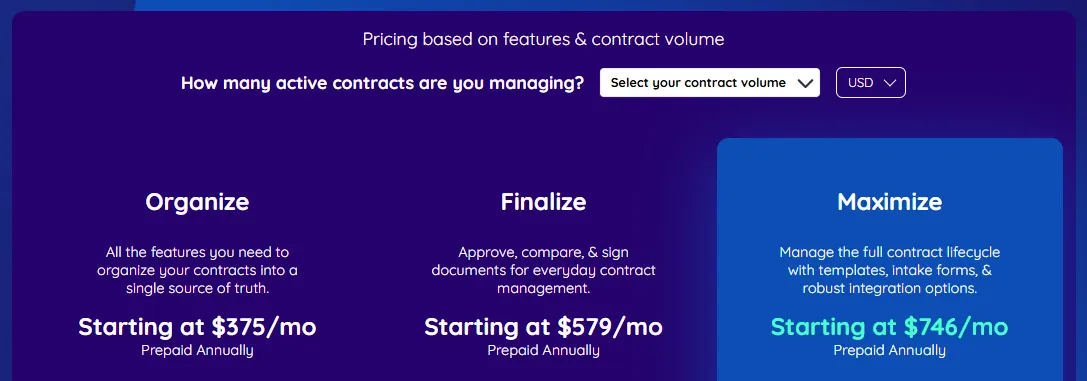
Compared to other Concord alternatives like Signeasy, PandaDoc, or Jotform, ContractSafe is definitely on the higher end of the pricing spectrum. The tool offers volume-based plans that start at $375/month and go up to $746/month. For small and scaling teams, it might feel a bit expensive over time.

With ContractSafe, you can email contracts straight into the system, and anyone in your team can add them without tech skills. The interface is intuitive, and getting started is easy. ContractSafe also offers solid enterprise features, like role-based access, reminders, AI assistant, and integrations with tools like Docusign and Salesforce (on higher plans). And while ContractSafe’s AI assistant pulls out key info from documents, users often say they end up correcting that data manually.

Pros
- Contracts can be added just by emailing them to a specific address.
- Offers role-based access, custom permissions, and world-class data protection.
Cons
- Pricing starts at $375/month, which can be steep compared to other alternatives.
- Many users report that the AI extraction misses details, requiring manual edits.
Ratings: 4.7 / 5 on G2
How to choose the right one for your business
Start by mapping out your needs. Are you looking for simple eSignatures or an end-to-end contract management platform? For small teams, affordability and ease of use should come first. Look for tools with transparent pricing, user-friendly interfaces, mobile apps, and responsive customer support.
If your team is growing fast or deals with high-volume contracts, prioritize automation, advanced team management, integrations (especially with CRMs or ERPs), and scalability. Also, pay attention to the update cycles and whether the platform grows with your feedback.
Don’t forget to check what users are saying on review platforms and public forums. These insights might save you from the issues you’ll face later. And finally, pick a tool that feels like a long-term partner, not just software.

What makes Signeasy a better Concord alternative?
Compared to Concord, Signeasy offers a more flexible and transparent pricing model that fits businesses of all sizes. While Concord’s update cycle feels sluggish, Signeasy continuously rolls out improvements based on user feedback.
Plus, its intuitive interface, mobile-first approach, and fast, reliable customer support make onboarding a breeze. For growing teams, Signeasy simply delivers more value with less hassle.




